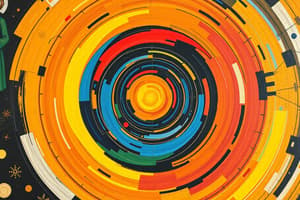Podcast
Questions and Answers
What did Galileo Galilei observe through his telescope?
What did Galileo Galilei observe through his telescope?
What did Galileo Galilei argue for?
What did Galileo Galilei argue for?
What did Isaac Newton discover?
What did Isaac Newton discover?
How did Newton build on Galileo's work?
How did Newton build on Galileo's work?
Signup and view all the answers
What was the main issue that the theories of Galileo, Kepler, and Copernicus sought to address?
What was the main issue that the theories of Galileo, Kepler, and Copernicus sought to address?
Signup and view all the answers
Which of the following statements accurately describes Nicolaus Copernicus's contribution to the Scientific Revolution?
Which of the following statements accurately describes Nicolaus Copernicus's contribution to the Scientific Revolution?
Signup and view all the answers
Which of the following statements is true about Tycho Brahe's contributions to astronomy?
Which of the following statements is true about Tycho Brahe's contributions to astronomy?
Signup and view all the answers
Which astronomer used the data collected by Copernicus and Tycho Brahe to determine that the Sun was the center of the universe?
Which astronomer used the data collected by Copernicus and Tycho Brahe to determine that the Sun was the center of the universe?
Signup and view all the answers
Which of the following statements best describes the impact of the Scientific Revolution?
Which of the following statements best describes the impact of the Scientific Revolution?
Signup and view all the answers
What significant discovery did Johannes Kepler make regarding the orbits of planets?
What significant discovery did Johannes Kepler make regarding the orbits of planets?
Signup and view all the answers
Study Notes
Galileo Galilei
- Observed four moons orbiting Jupiter, the phases of Venus, and imperfections on the Moon's surface through his telescope
- Argued for the Copernican heliocentric model, which states that the Earth and planets revolve around the Sun
Isaac Newton
- Discovered the laws of motion and universal gravitation
- Built on Galileo's work by mathematically describing the motions of celestial bodies and the forces acting upon them
Theories of Galileo, Kepler, and Copernicus
- Sought to address the geocentric model, which placed Earth at the center of the universe
- Proposed a heliocentric model, where the Sun is the center of the universe
Nicolaus Copernicus
- Contributed to the Scientific Revolution by proposing the heliocentric model in his book De revolutionibus orbium coelestium (1543)
Tycho Brahe
- Contributed to astronomy by collecting precise data on planetary motions and celestial events
Johannes Kepler
- Made a significant discovery that the orbits of planets are elliptical, rather than circular
The Scientific Revolution
- Had a profound impact on the understanding of the natural world, marking a shift from geocentric to heliocentric models
- Led to the development of modern scientific methodologies and the emergence of new scientific disciplines
Studying That Suits You
Use AI to generate personalized quizzes and flashcards to suit your learning preferences.
Description
Test your knowledge on the Scientific Revolution and Nicolaus Copernicus, a Polish priest and astronomer who challenged the prevailing beliefs of his time. Learn about the sweeping change in scientific views during the 16th and 17th centuries.




